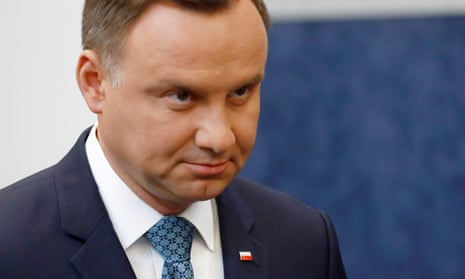The Polish president Andrzej Duda’s decision to yield to street protests and veto two of three bills that threatened to give the ruling Law and Justice party (PiS) control of the country’s judicial system was as surprising as it was dramatic.
A former PiS MEP and relative unknown before his election to the presidency in 2015, Duda, as the country’s head of state, is nominally above party politics. In practice, however, he has played an instrumental role in his former party’s hostile takeover of public media outlets and the country’s highest constitutional court. Critics have accused him of violating his oath to uphold the Polish constitution on innumerable occasions.
The protesters focused their attention squarely on Duda and his power of veto and – for now – they have succeeded. What comes next is less clear and will depend on the rationale behind the president’s decision.
The first possibility is that the vetoes signal a wholesale climbdown on behalf of the government: the abandonment of its plan to seize effective control of judicial appointments.
Optimistic observers cite the example of the so-called Black Protest in October against a proposed blanket ban on abortion, when hundreds of thousands of protesters – predominantly women wearing black – took to the streets and forced a government volte-face.
Although the government did not initiate the abortion ban, which was proposed by hardline conservative groups, PiS MPs had waved it through the early stages of the legislative process, sparking a furious reaction they had clearly not expected.
It is a conventional wisdom that as an authoritarian-minded party, anger on the streets is the only kind of opposition PiS respects or understands. The argument goes that every now and again the party will go too far, trigger public anger, and then retreat to lick its wounds.
The second possibility is that Duda’s vetoes mark only a tactical retreat. The president has not rejected the government’s proposals outright. Instead, he has spoken of the need to “repair” them so that public faith is restored.
Duda or the government could propose a new set of proposals amounting to token concessions that do little to address the fundamental concern of the protesters: that the independence of the judiciary is under threat.
PiS may be hoping it can take the wind out of the protesters’ sails, portraying itself as the reasonable party to the dispute and the protesters as acting in bad faith when they inevitably reject the government’s “generous” concessions.
Advocates of this interpretation note Duda threatened last week to veto the legislation unless the government agreed to a series of concessions. Initial excitement among the protesters soon faded, however, as it became clear his conditions did nothing to address the fundamentally undemocratic nature of the changes. Rather than asserting his independence and defending the rule of law, Duda appeared to be coordinating his response with the government so as to facilitate the legislation’s eventual enactment.
The third possibility is that after two years in office, Duda has finally decided to define himself in opposition to his former party.
Long ridiculed for his apparent dependence upon and subservience to the PiS leader, Jarosław Kaczyński, Duda may have decided that a close association with the Law and Justice project will do his re-election prospects more harm than good.
Although there is little reason to believe that is the case, were Duda to split from his mentor and patron it could be the first act of a revolution within the ruling party, leading to a split and its eventual downfall.
But as they wait for Duda and the government to make its next move, excitement among the protesters about the veto is giving way to a troubling question: why, in 2017, do they still need to fight so hard for something as basic as the right to a fair trial.










